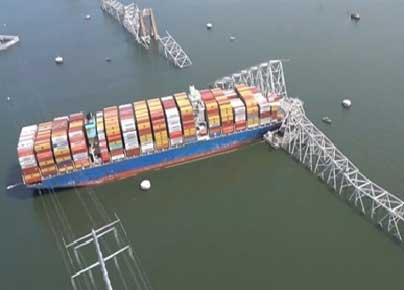CMA CGM declares "Force Majeure" in response to Baltimore Bridge Collapse
2024-03-29

The major carriers are scrambling to assist customers and formulate plans in the wake of this week's incident, which suspended vessel traffic in the Port of Baltimore indefinitely. While no container vessels were on the dock at the time of the incident, CMA CGM reports that the terminal stopped receiving exports as of 11 a.m. on March 26, prompting the carrier to issue a notice of Force Majeure to customers. CMA CGM is informing customers of contingency plans under the terms and conditions of its bill of lading. Exports on the terminal, they say, will stay there until the port reopens, while boxes destined for the port can be rerouted at the shipper's expense.
They recommend Norfolk wherever possible or, alternately, New York. Boxes on the water will be discharged at an alternate port where CMA CGM's bill of lading will terminate and be made available for pick-up. Other major carriers are issuing similar advice to their customers.
MSC Mediterranean Shipping Company's customer alert warns that service "will not be reestablished for several weeks if not months." They are taking similar actions to CMA CGM, reporting that cargo from Europe will be diverted to New York. Ships from Asia are also mostly diverting cargo to New York and Norfolk; in one case, the cargo will be going to Philadelphia. Maersk wrote to its customers, "We understand your need for clarity on your cargo, as well as future changes to our routes regarding Baltimore. We are working diligently to identify solutions and will inform you as soon as possible of changes to current and future cargo to Baltimore." Maersk and MSC acknowledged that they had customers' shipments aboard the Dali, which will likely remain caught for weeks or longer until the salvage operations can begin.
The Unified Command now says that 14 containers were impacted, holding chemicals, including soap products, perfume products, or unspecified resin. A total of 56 containers holds shipments labelled as hazardous, including the NTSB, said batteries. Synergy Marine managers of the Dali reported 4,679 TEU aboard the vessel with a capacity of 10,000 TEU. However, pictures show the ship heavily laden, likely with empties, as she was heading to Asia. Claims consultant WK Webster is advising, "The prospect of General Average being declared may now be more likely given the apparent significant costs that will need to be incurred to extricate the vessel from its current position and bring it to a place of safety before considering on-carrying cargoes to their intended destinations. It is also possible that salvage services required by the vessel may be rendered on LOF (Lloyd's Open Form, formally "Lloyd's Standard Form of Salvage Agreement") or similar terms. In the event of either a declaration of General Average and/or LOF Salvage, securities will need to be provided for all cargo on board." An analysis of the bill of ladings by Bloomberg reports the vessel discharged some 7,000 tons of goods in Baltimore to major shippers, including Ikea and Electrolux. They believe the ship had furniture, appliances, plasticware, and construction machinery aboard. Ports along the U.S. East Coast are all reporting working with shippers and carriers to plan diversions.
Today, the Governors of New York and New Jersey, Kathy Hochul and Phil Murphy, issued a joint statement. "The Port Authority of New York and New Jersey can take on additional cargo, and we have directed the Authority to further evaluate all available resources to minimize supply chain disruptions. Along with our federal partners, we will continue to work together to support our neighbours in Baltimore and consumers nationwide." Bloomberg quotes Jim Monkmeyer, president of transportation at DHL Supply Chain, a Deutsche Post company, as saying he has heard estimates of the Baltimore channel's reopening taking six weeks, sometime in May.









